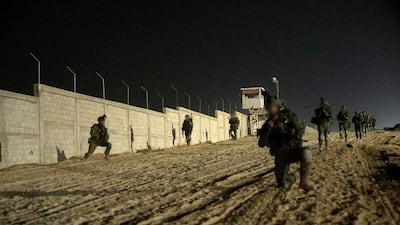Live updates: Follow the latest on Israel-Gaza
Israel’s military said it seized full control of a stretch of land along Gaza’s border with Egypt, known as the Philadelphi Corridor, to cut off tunnels used by Hamas to smuggle weapons and goods.
The move could complicate Israel’s relations with Egypt, which has complained about Israel's advance towards its border. Israel says the corridor is awash in tunnels, despite a years-long blockade imposed by Israel and Egypt.
Israel also deepened its invasion into Rafah, where hundreds of thousands have sought shelter from fighting,. Intensified violence in the area in recent days has killed dozens of Palestinians and the Israeli military said a fifth brigade – several thousand soldiers – joined troops in the city on Tuesday.
What is the Philadelphi corridor?
The 14km-long area, also called the Salah Al Din corridor, is on the border between Gaza and Egypt. It is within a buffer zone under the 1979 Camp David peace agreement between Egypt and Israel.
The agreement allows Israel and Egypt to send forces with limited numbers and specific equipment into the corridor, with the aim of carrying out patrols on the Egyptian side to prevent smuggling, infiltration and other criminal activities.

The corridor is part of a larger demilitarised zone along the entire Israel-Egypt border. Under the peace accord, each side is allowed to send a small number of troops or border guards to the zone, though those numbers can be modified by mutual agreement. At the time of the accord, Israeli troops controlled Gaza, until Israel withdrew its forces and settlers in 2005.
What does the Camp David deal offer Israel?
The agreement signed in the 1979 Egyptian-Israeli peace treaty split the border area in the Sinai Peninsula into four zones: A, B, C and D. Zone A is in western Sinai and is adjacent to the Suez Canal and the Gulf of Suez, Zone B in central Sinai, while Zone C is in eastern Sinai, adjacent to the Gulf of Aqaba and the border strip with Gaza.
The agreement allowed Israeli presence specifically in Zone D, to the east of the Sinai Peninsula and within Gaza, with a limited force of four infantry battalions, their military installations and field fortifications, as well as UN observers.
Israeli forces in Zone D cannot include tanks, artillery and anti-aircraft missiles except surface-to-air missiles.

The main elements of the four Israeli infantry battalions will consist of up to 180 armoured personnel vehicles of all types and up to a total of 4,000 personnel.
In Zone C, only UN forces and Egyptian civil police are allowed any physical or military presence.
What happened in 2005?
Israeli forces controlled Zone D until their withdrawal from it and the Gaza Strip and handed it over to the Palestinian Authority in 2005. To arrange for an Egyptian presence for border guard forces, a new agreement was signed then known as the Philadelphia Agreement secondary to the Camp David Agreement, which specified a 14km buffer strip along the border between Egypt and Gaza.
The agreement came in 2004 after Israel's Knesset approved a decision to withdraw all Israeli forces from the Gaza Strip, with the deal coming into force in August 2005.

The agreement allowed Israeli-Egyptian security co-ordination, and an Egyptian security presence from the border guard forces along the Philadelphi Corridor to patrol both sides.
It stipulates that the Egyptian forces along the border are tasked to “combat terrorism and cross-border infiltration” and are not intended for any military purposes.
Israeli allegations
Egypt's state-run Al Qahera News television reported there were “no communications with the Israeli side” on the allegations of finding tunnels on the border. Egypt has repeatedly expressed concerns that the Israeli offensive could push Palestinians across the border – a scenario Cairo says is unacceptable.
Since Hamas took over in 2005, smuggling tunnels were dug under the Gaza-Egypt border to get around the Israeli-Egyptian blockade. Some of the tunnels were large enough for vehicles. Hamas brought in weapons and supplies, and Gaza residents smuggled in commercial goods, from livestock to construction materials.

That changed over the past decade, as Egypt battled ISIS militants in Sinai. The Egyptian military cracked down on the tunnels and destroyed hundreds of them.
White House National Security spokesman John Kirby said the seizure of the Philadelphi Corridor would be consistent with the “limited” ground operation Israeli officials briefed President Joe Biden’s team on for the city of Rafah.
“When they briefed us on their plans for Rafah it did include moving along that corridor and out of the city proper to put pressure on Hamas in the city,” Mr Kirby said on Wednesday.
– With additional reporting from AP


